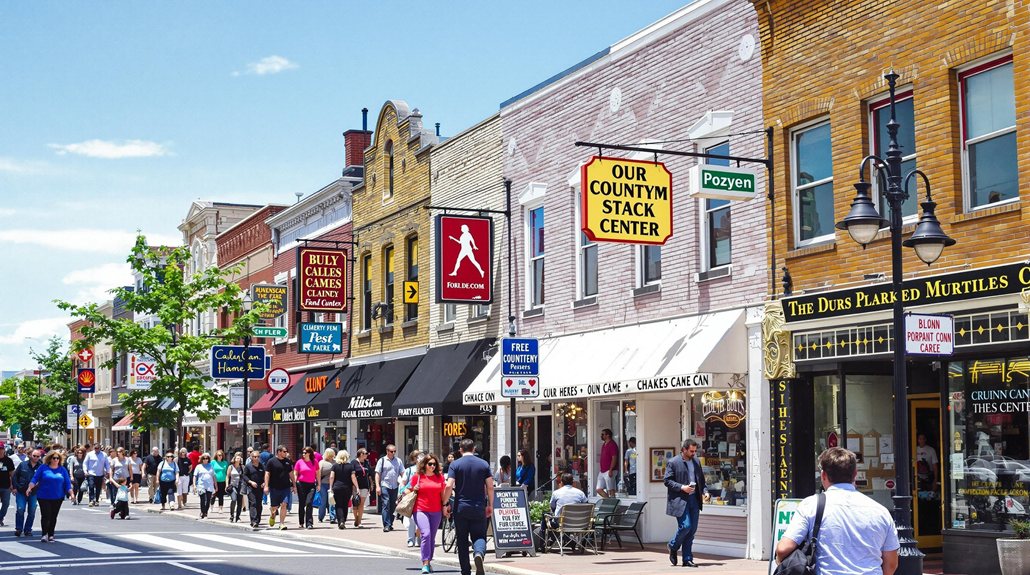Local SEO content writing is the strategic creation and optimization of online content tailored to specific geographic locations. It aims to improve your business's visibility and relevance in local search results. This involves identifying relevant keywords, crafting unique and valuable content for your target service areas, and positioning your business as a trusted local authority. Continue reading to dive deeper into the key elements and best practices of effective local SEO content writing.
Understanding the Purpose of Local SEO Content

Understanding the purpose of local SEO content is crucial for businesses that want to boost their visibility and attract nearby customers. Local SEO focuses on optimizing websites and online profiles for specific geographic areas, helping you reach your target audience – local customers searching for products or services in your vicinity. Performing local keyword research can uncover the search terms and queries most relevant to your business and area. By creating relevant, location-specific content, you can enhance your search engine rankings, secure top spots in the Google local pack, and gain a competitive edge in your local market. Incorporating long-tail keywords, optimizing meta tags, and building local authority through reviews, citations, and community engagement can further drive conversions and sales by connecting you with active, nearby leads.
Targeting Specific Geographic Locations

Pinpointing your business's geographic service areas is crucial for effective local SEO targeting. Targeting specific geographic locations is key for crafting location-specific content that helps your brand resonate with regional audiences and improve search visibility in those areas. Incorporating strategic regional content strategies can bolster your local SEO efforts and drive more qualified leads. Focusing on the unique needs and preferences of each local market can enhance the relevance and impact of your content.
Geographic Service Areas
As a service area business, your geographic service areas refer to the specific regions where you operate and provide your services. This often involves a broader geographical span compared to brick-and-mortar locations. However, the lack of a physical storefront complicates your local SEO efforts. Effective local SEO is essential, helping you appear in search results for your target areas. Claiming and optimizing your Google Business Profile enables you to specify your service areas and increase visibility. Using location-specific keywords is crucial to rank well in local search. Crafting high-quality, unique service area pages further enhances your local SEO, driving more potential customers to your business. Businesses located on the border of two different cities or suburbs may face challenges in their local SEO efforts.
Location-Specific Targeting
Location-specific targeting is the process of optimizing your digital content to appeal to users within specific geographic locations, such as cities or states. Its primary goal is to increase visibility and drive localized traffic to your business, enhancing your online presence. Utilizing tools like Google Keyword Planner for keyword research is essential for effective location-specific targeting. Key techniques include optimizing your website for local keywords and ensuring consistency in your business listings across directories. Local SEO helps you rank higher in local search results, leading to higher conversion rates due to targeted audience engagement.
Regional Content Strategies
When targeting specific geographic regions, your content strategy must shift to address the unique needs and preferences of those audiences. Local SEO is the practice of optimizing online presence to attract more business from relevant local searches. Focus on geographic targeting, identifying regions based on state or provincial boundaries. Demographic targeting can also be valuable, honing in on audiences with shared characteristics. Craft region-specific content that resonates with local interests and concerns. Engage on social media platforms to connect with regional communities. Manage online reviews to build trust and credibility. This multifaceted approach can increase visibility, attract targeted traffic, and establish your brand as an authority within the regions you serve.
Diverse Types of Local SEO Content

To effectively leverage local SEO, you'll need to create diverse types of content that cater to the unique needs and search behaviors of your target audience. This may include service pages, state pages, regional/metro area pages, city pages, and even neighborhood/suburb pages. Additionally, crafting location pages, service-area pages, city-specific landing pages, and state or regional landing pages can enhance your local visibility. Leveraging local directories can also be an effective way to build trust and credibility in your community. Don't forget about leveraging FAQs, testimonials, blogs, practitioner pages, and case studies to further establish your business as a trusted local authority.
| Types of Local SEO Content | Geographic Specificity in Content | Content Formats for Local SEO |
|---|---|---|
| Service Pages | Location Pages | FAQ Pages |
| State Pages | Service-Area Pages | Testimonial/Review Pages |
| Regional/Metro Area Pages | City-Specific Landing Pages | Blog Articles |
| City Pages | State or Regional Landing Pages | Practitioner Pages |
| Neighborhood/Suburb Pages | Local Directories | Local Case Studies |
Key Elements of Effective Local SEO Content
To craft effective local SEO content, you'll want to focus on optimizing for relevance. Leverage internal linking to connect your location-specific pages and reinforce their significance. By aligning your content with the needs and interests of your local audience, you can improve its visibility and impact.
Local Relevance Optimization
Effective local SEO content requires a strategic focus on optimizing for local relevance. This means incorporating location-specific keywords, addressing local questions and concerns, and showcasing your connection to the community. Publish blog posts covering local issues, trends, and events to demonstrate your area expertise. Create service-specific pages that highlight your localized offerings. Encourage customer reviews and feedback to build trust and credibility with your local audience. Ensure your website is mobile-optimized, as most local searches originate from smartphones. By prioritizing local relevance, you can attract more targeted traffic and improve your chances of ranking higher in location-based searches. Utilizing long-tail keywords in addition to head terms for local targeting can further enhance the effectiveness of your local SEO content.
Leveraging Internal Linking
Beyond optimizing for local relevance, leveraging strategic internal linking is a key component of effective local SEO content. Utilize descriptive, keyword-rich anchor text to enhance link context and user experience. Organize your site structure logically, using sitemaps to facilitate efficient crawling and user exploration. Internal links boost engagement, retention, and content performance by guiding visitors through related topics. Strategically place links within natural content flow, regularly reviewing and updating them to maintain optimal SEO impact. Remember, a cohesive site structure supported by powerful internal linking can significantly improve your local search visibility and rankings.
The Importance of Local SEO for Businesses
As a business owner, you can't afford to overlook the significance of local SEO. It boosts your online presence, connects you with active local customers, and gives you a competitive edge. By optimizing for local keywords, you'll appear more relevant to nearby searchers, leading to higher conversion rates. Reduced advertising costs allow you to allocate more budget to other areas. Building trust is also crucial – positive reviews and an engaging Google Business Profile signal legitimacy, fostering stronger customer relationships. Local SEO drives immediate sales too, with a high percentage of searches resulting in purchases. Invest in strategic efforts like keyword research and content tailored to local needs. Ultimately, local SEO powers your business's growth by increasing visibility, trust, and revenue.
Optimizing Service Pages for Local Search
Optimizing your service pages for local search is a critical component of an effective local SEO strategy. Incorporate your location and target keywords into page titles and meta descriptions to enhance visibility in local search results. Use compelling calls-to-action and concise content summaries to encourage clicks. Ensure your meta descriptions accurately reflect the page content to improve user experience. Develop location-relevant content, include local testimonials, and integrate geographic references to establish a strong connection with your target audience. Implement clear URL structures, utilize schema markup, and optimize for mobile to further boost your local search performance.
Leveraging State and Regional Content Strategies
If your business services cover multiple states, state-based SEO can boost your visibility. Likewise, if you cater to regional markets, a regional content strategy can expand your reach. Explore how state and regional approaches can enhance your local SEO content writing efforts.
Service Coverage by State
Why not leverage state-level content to boost your local SEO visibility? State pages act as high-level hubs, capturing broader search queries and guiding users to city-level content. Incorporate localized keywords and unique, high-quality content tailored to the area's nuances. Add state-specific details and visual aids to engage your audience. This strategy increases visibility among local audiences, enhances your credibility, and supports businesses with operations across multiple cities. Conduct keyword research, create relevant and optimized content, and monitor performance to refine your approach. With a well-executed state-level content strategy, you can elevate your local SEO efforts and reach more potential customers.
Targeting Regional Markets
Frequently, businesses overlook the importance of targeting regional markets beyond their immediate local area. However, a comprehensive regional SEO strategy can significantly boost your online visibility and relevance across broader geographic areas. To effectively target regional audiences, consider these key elements:
- Conduct thorough regional audience research to understand their unique interests, needs, and preferences.
- Optimize content with regionally-relevant keywords to improve search rankings in specific states or regions.
- Develop geo-specific content that addresses regional issues, events, or attractions to resonate with local audiences.
- Utilize social media and local engagement strategies to build strong connections with regional communities.
Utilizing Blogs to Engage Local Audiences
Blogs are a powerful tool for engaging local audiences and boosting your local SEO efforts. By creating content that's relevant to your geographic area, you can capture search traffic and establish your business as a trusted authority within the community. Ensure your blog posts integrate targeted local keywords, reference local landmarks or events, and link to other local resources. This enhances the content's local relevance and signals to search engines that your business is a valuable local resource. Additionally, blogging allows you to connect with your audience by discussing hyperlocal topics and customer reviews, building trust and driving conversions.
Creating Informative Neighborhood Guides
Crafting informative neighborhood guides is a strategic way to engage local audiences and bolster your SEO efforts. These guides should cover key elements like neighborhood history, notable landmarks, and unique characteristics. Incorporating high-resolution visuals, market trends, community features, and educational institutions can further enhance the user experience.
To maximize impact, consider highlighting:
- Recreational amenities
- Community spaces
- Security features
- Sustainable living options
- Proximity to public facilities
Tailoring the content to target specific buyer groups, such as remote workers or eco-conscious individuals, can also improve its relevance and appeal.
Conducting Thorough Local Research and Keyword Analysis
When conducting thorough local research, you'll want to leverage a variety of tools and techniques to uncover valuable insights about your target market. Start by using Google Trends and Autocomplete to explore popular search terms. Identify relevant seed keywords and analyze competitors' websites to spot gaps in their keyword strategies. Understanding your local audience's needs and preferences is crucial. Align your content with local culture and events to enhance engagement. Utilize long-tail keywords, assess search volumes, and consider location modifiers and keyword difficulty to refine your approach. Examine customer reviews and social media insights to capture authentic local search behaviors, then regularly update your SEO strategies based on performance data.
Crafting Compelling Content Briefs for Local SEO
Effective local SEO content briefs serve as a roadmap, ensuring your content aligns with specific goals and strategies. The brief should define your local target audience, incorporate relevant keywords and trends, and provide insights into local competitors. Utilize SEO optimization tools to streamline the process.
Key components include:
- Target keywords
- Optimal word count and structure
- Strategically-placed headings and subheadings
- Local-specific topics
- Compelling meta descriptions
Applying Optimization Techniques to Local Content
To effectively optimize your local content, you'll want to focus on enhancing your Google Business Profile and managing local citations. Ensure your profile is complete, use strategic keywords, and maintain NAP consistency. Regularly update your content and promptly respond to reviews. Utilize citation tools to audit and boost visibility through multiple directories. Encourage customer reviews, engage with feedback, and monitor trends to improve your local online presence. Optimize your website with mobile-friendly design, location-specific pages, and schema markup. Create and distribute hyper-local content that covers local news and engages your community. By applying these techniques, you can maximize the impact of your local SEO content.
Maintaining Relevance Through Regular Content Updates
Keeping your local content relevant requires regular refreshes. Adapt your content to seasonal trends and events to maintain its timeliness. Ensure your business adapts to changing customer needs through consistent content updates.
Timely Content Refreshes
Regular content updates are crucial for maintaining relevance in your local SEO strategy. Timely content refreshes help keep your business visible in local search results and enhance your credibility with both search engines and your audience. Some key benefits of content refreshes include:
- Improved search engine rankings as a result of updated metadata and keywords
- Increased conversions by ensuring your content stays relevant and valuable
- Enhanced user experience leading to longer site engagement
- Better overall SEO performance through historical optimization of old content
Incorporating a strategic content update plan, leveraging local keywords, and aligning with community events are essential best practices for effective local SEO content writing.
Seasonal Content Adaptations
As consumer behavior and search patterns fluctuate with the seasons, it's crucial to adapt your local SEO content to maintain relevance. Identify seasonal keywords using research tools and competitor analysis, focusing on location-specific terms. Craft seasonal blog posts, event guides, and promotions that address timely user needs. Update your Google My Business listing with seasonal information and seek local backlinks to boost authority. Utilize schema markup and ensure mobile optimization to enhance interactivity and visibility. Measure the impact of your seasonal content through ranking tracking, traffic analysis, and conversion rate evaluation. Refine your strategies based on data to improve future seasonal SEO efforts.
Integrating Local SEO Content Into a Broader Strategy
Integrating local SEO content into your broader content strategy is crucial for enhancing your local relevance and visibility. By aligning your local efforts with your overall SEO goals, you can create a cohesive and impactful content plan. Key strategies include:
- Tailoring content to reflect local events, news, and cultural nuances
- Optimizing your Google My Business listing with relevant information
- Encouraging user-generated content like reviews and social posts
- Collaborating with local businesses or influencers to reach your target audience
Best Practices for Enhancing Local SEO Content Performance
How can you enhance the performance of your local SEO content? Utilize geographic keywords, optimize service pages, and leverage local events. Embed Google My Business listings and feature local testimonials to improve visibility. Conduct keyword research, create location-specific content, and promote it on social media. Monitor competitors and syndicate your content to increase reach. Answer local queries, cover local-specific topics, and highlight community involvement. Ensure NAP consistency, optimize for mobile, and regularly update your content. Focus on quality, establish topic authority, and collaborate with local leaders to build your brand's credibility.
